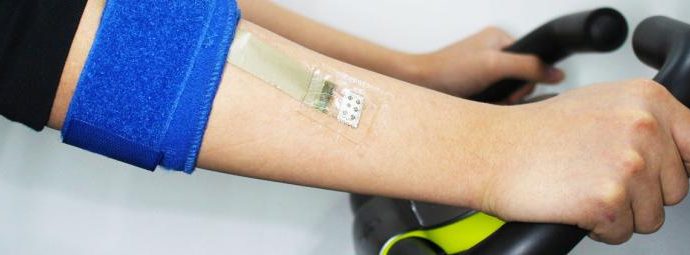Electrochemical analysis of sweat using soft bioelectronics on human skin provides a new route for noninvasive glucose monitoring without painful blood collection.
However, sweat-based glucose sensing still faces many challenges, such as difficulty in sweat collection, activity variation of glucose oxidase due to lactic acid secretion and ambient temperature changes, and delamination of the enzyme when exposed to mechanical friction and skin deformation. Precise point-of-care therapy in response to the measured glucose levels is still very challenging. We present a wearable/disposable sweat-based glucose monitoring device integrated with a feedback transdermal drug delivery module. Careful multilayer patch design and miniaturization of sensors increase the efficiency of the sweat collection and sensing process. Multimodal glucose sensing, as well as its real-time correction based on pH, temperature, and humidity measurements, maximizes the accuracy of the sensing. The minimal layout design of the same sensors also enables a strip-type disposable device. Drugs for the feedback transdermal therapy are loaded on two different temperature-responsive phase change nanoparticles. These nanoparticles are embedded in hyaluronic acid hydrogel microneedles, which are additionally coated with phase change materials. This enables multistage, spatially patterned, and precisely controlled drug release in response to the patient’s glucose level. The system provides a novel closed-loop solution for the noninvasive sweat-based management of diabetes mellitus.
Diabetes is one of the most prevalent chronic diseases, causing uncontrollable blood glucose levels. Patients with diabetes are advised to check their blood glucose level daily and to take periodic insulin shots for continuous management of their blood glucose level. However, patients often do not follow this recommendation because of the pain and accompanying intense stress of repetitive blood collection and insulin shots. This often leads to various severe diabetic complications, such as cardiovascular and kidney diseases, stroke, blindness, and nerve degeneration. In addition, insulin overtreatment causes an abrupt drop in the blood glucose concentration, which may cause seizures, unconsciousness, and even death. Therefore, a novel method for painless and stress-free glucose monitoring and precise maintenance of homeostasis through controlled drug delivery is highly desirable.
Extensive efforts have been made to develop noninvasive sweat-based biomarker monitoring methods. Wearable biosensors enable continuous monitoring of metabolites [including glucose, lactate, and alcohol] and electrolytes [including potassium, calcium, and heavy metal ions] in sweat. The estimation of the blood glucose concentration based on the sweat-based glucose measurement is a potential solution. However, many challenges still exist for the accurate sweat-based glucose measurement. For example, the sweat collection procedure is tedious, and the sweat collection times vary depending on environmental conditions. In addition to the difficulty of measuring glucose levels in sweat because of its much smaller concentration than that in blood, lactic acid in sweat, ambient temperature changes, and various medications can induce errors in enzyme-based glucose sensing. Mechanical friction and deformation of devices on soft human skin can delaminate the enzyme from the glucose sensor and cause mechanical fractures in devices. A closed-loop system with the feedback delivery of a precisely controlled amount of drugs in response to the glucose monitoring result is another important unaccomplished goal for maintaining homeostasis.
Various kinds of flexible and stretchable devices based on an ultrathin and stretchable design have been developed for monitoring individual health status and delivering the corresponding feedback therapy. Here, we develop a patch-based wearable/strip-type disposable system for noninvasive sweat glucose monitoring and microneedle-based point-of-care therapy. Key novel advantages of this system include (i) mass production–compatible porous metal-based electrodes and fabrication processes, (ii) miniaturized sensor design that allows for reliable sweat analysis even with an infinitesimal amount of sweat, (iii) patch- and disposable-type design for enhancing practical applicability, (iv) multiple sweat control and uptake layers for efficient sweat collection, (v) a porous gold nanostructure for maximizing the electrochemically active surface area for detection of a small amount of glucose in sweat with high sensitivity, (vi) multiple glucose sensing devices for enhanced accuracy, and (vii) multistage and precisely controlled transdermal drug [metformin or chlorpropamide (type 2 diabetes drugs)] delivery through biocompatible hyaluronic acid hydrogel microneedles containing drug-loaded phase change nanoparticles (PCNs). Metformin is one of the first-line drugs for treating type 2 diabetes. Because drug delivery through the skin can bypass the digestive system, transdermal delivery of metformin requires a lower dosage of drugs than oral delivery and prevents gastrointestinal side effects. This novel system for high-fidelity sweat glucose measurement and feedback-controlled drug delivery enables efficient management of blood glucose concentration without pain and stress.
Source: Science Mag

































Leave a Comment
You must be logged in to post a comment.